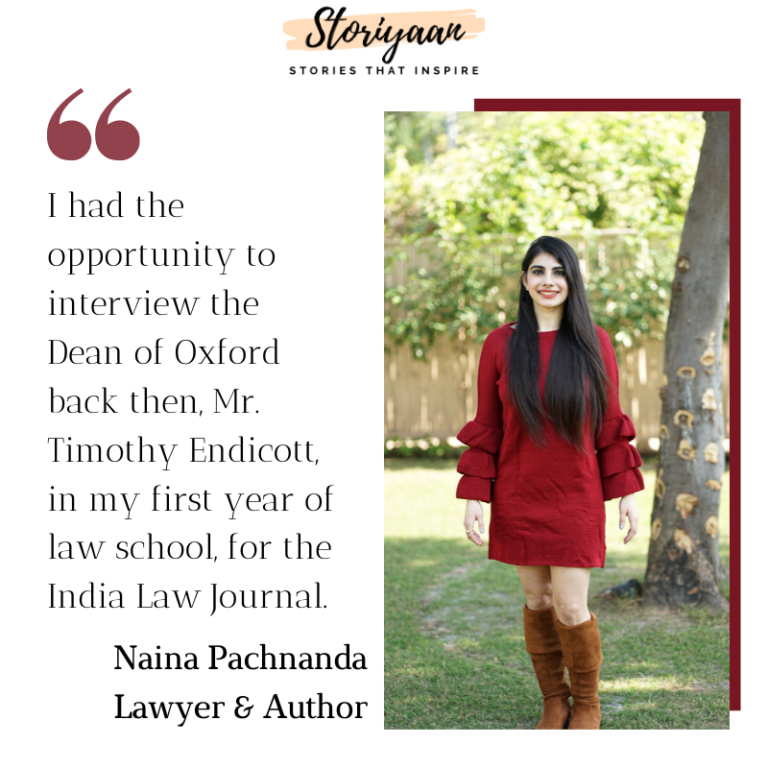A lawyer by profession, a poet by passion, and a tarot card reader by fascination is how Naina Pachnanda describes herself. As she calls herself the lawyer with a poetic soul, she aims at bringing a change in society with this power of veracity. In conversation with Storiyaan, she shares her experience of working on legal regulatory/policy-making of technology commercialization at Invest India, practicing as an advocate in the Supreme Court of India, High Court of Delhi, and various district courts; she also talks about being a student of the National University of Juridical Sciences ( NUJS, Kolkata) and an editor of the India Law Journal. She reiterates how her unquenchable curiosity for learning more has been one of the most powerful guiding forces in her life.
Describing how she didn’t let the pandemic hamper her indomitable spirit Naina Pachnanda asks the readers to stay strong in the crucial stage of lockdown as she recites, “We are all one, and we all suffer alike; Illness doesn’t view wealth, stature, wrong or right; All of us are on this planet at this moment, together, Karmically bound like birds of the same feather,” Have a look at this insightful interview and we are sure it will leave you in awe.

Interview
Questions and answers
Coming from a law background and pursuing it on the professional front, how did you get enchanted by poetry?
I always had a flair for writing poetry. I was in my 5th standard when I wrote a poem on Harry Potter and it got published in the Tele Kids, a popular supplement with The Telegraph newspaper, while I was studying in Kolkata. I was stunned and elated at the same time. And that is what gave 10-year-old me the confidence to continue writing.
How did the various law internships amplify your skills and gravitate you towards your niche?
I studied law at NUJS where the atmosphere was healthily competitive and inspiring. Through my five years at law school, the summer and winter breaks always took up my time, in the form of internships. And it was these internships that really contributed to shaping my areas of practice once I graduated and helped me to understand my inclination towards practicing as a litigation lawyer. However, life, in general, is a learning process and there is nothing wrong with wanting to pursue different careers, at any given point in time. After having litigated for 5 years, I now work on legal/regulatory aspects of technology commercialization at the government’s AGNIi program ( Accelerating Growth of New India’s Innovations) at Invest India – the National Investment Promotion and Facilitation Agency of India.
What are some essential lessons you experienced as an editor of the India Law Journal?
I was lucky to have the opportunity of working with India Law Journal from my first year of Law school itself. I started working with them as an Associate editor. I got to interact with a lot of legal luminaries via the India Law Journal. I got to write book reviews, edit articles written by legal dignitaries. I also had the opportunity to interview the Dean of Oxford back then, Mr. Timothy Endicott for the India Law Journal in my first year itself. The exposure I got by working with the India Law Journal, indeed played a very vital role in shaping my career.
What has been a path-breaking case that bestowed on your trajectory as a lawyer?
There have been many path-breaking cases but one major one is the judgment that ensured the functioning of the National Company Law Tribunal (NCLT) and the National Company Law Appellate Tribunal (NCLAT), in 2015, while I was working with Senior Advocate Mr. Paramjit Singh Patwalia in the Supreme Court of India. I am very humbled to be one of the lawyers to have assisted in this matter.
Being actively involved in legal and regulatory aspects, how do you churn through the busy schedule and take time out for poetry.
Poetry is my happy space. I don’t have to make a schedule and take time out for it particularly. I happily write 6-7 poems in a span of 12-15 mins when I am in that particular headspace. I pen down the emotion that pops inside me and put it up on my Instagram handle @naina.pachnanda, unapologetically so, for everyone to benefit from it so that none of us ever feel alone. We are all in the same boat, going through similar emotions and challenges at every given point of time – different circumstances maybe, but challenges nonetheless; and we will all cross the shore together.
As a lawyer and a poet, how did you develop a keen interest in tarot card reading?
I call myself a lawyer by profession, a poet by passion, and a tarot card reader by fascination. I have always been a very spiritual and curious ( yet not inquisitive) person since I was young. This is what led me to study and understand tarot cards. Tarot has the ability to guide and answer all that one is seeking and that is what ignited my enthusiasm and desire to learn it a few years ago, with the intention to be able to help as many people as I can via this medium.
As an avid practitioner can you brief us a bit about Nichiren Buddhism. How did you discover this spiritual inclination?
Nichiren Buddhism imparts the philosophy of cause and effect. The practice of Nichiren Buddhism makes us aware that both the problem and the solution lie within us. Instead of blaming circumstances around us, it is essential to take full responsibility for our actions and create a beautiful destiny for ourselves.
I was introduced to Nichiren Buddhism in 2014 by my best friend Ananya Gupta and my life has changed for the better ever since. Even while going through the most challenging situations that life may throw, I am able to find happiness and peace within myself, only because of this practice.
Have you ever worked on a case or criminal trial that evoked your emotions? If yes, what are those situations?
Yes, I have always addressed myself as a ‘lawyer with a soul’! It was during law internships in 2011 and 2012 that I had the opportunity to work and assist lawyers on the 2G scam case, the Bhopal gas tragedy case, the 1993 Bombay blast case, amongst others. However, the only emotion that kicked in, inside of me was that of excitement! And this is what imbibed my interest in criminal law – as a result of which I took up every criminal law course in the coming years at law school.
As a multitasker with a hectic schedule, how did you gulp down the lockdown period?
The lockdown period has touchwood been the busiest time of my life. I was fully committed to my work at Invest India; devoted 1 to 2 hours regularly to chanting, which is what kept me sane and productive. I spent the nights devoting my time to writing two books. My first book ‘A New India’, based on the Government’s schemes to build a New India was launched last month, by Ms. Smriti Irani, Hon’ble Minister of Women and Child Development and Minister of Textiles.
My second book is soon to be out.
While the law can ensure control, poetry has the strength to bring a change. What do you want to convey to people through your poetry?
With everything that is going around, I would like to convey a message through one of my poems and let people know that they are not alone in these unprecedented times. “We are all one and we all suffer alike, Illness doesn’t view wealth, stature, wrong or right; We are all on this planet, at this present moment together; Karmically bound, like birds of the same feather”.
What is your secret behind managing seeming so effortless despite managing a hectic schedule?
Practicing Nichiren Buddhism is my secret to everything in life. Chanting Nam Myoho Renge Kyo, attending Buddhism meetings, interacting with people in the practice, is what have kept me going through the pandemic. It is what brings me peace of mind; and it is what helps me overcome life’s numerous challenges, with wisdom, compassion, and courage.
If you could bring any law into force what would it be and why?
Artificial intelligence, as it is is a growing industry and the need of the hour.
Quick 5
1. Your role model – My father Ranjit Pachnanda and my sister Gitanjali Saraf.
2. Your mantra in life that keeps you motivated – Don’t waste time comparing yourself or your progress to that of others. Each of us has our own unique mission for which we have each taken birth and only we can individually fulfill.
3. Law or poetry – A lawyer with a poetic soul.
4. If you could go back in time what is one historical law trial that you would love to be a part of. – The Arushi Talwar case; and The Nirbhaya case- where my brother Advocate Vikrant Pachnanda assisted the public prosecutor.
5. If you had to describe Indian Judiciary in one word – Sound.

